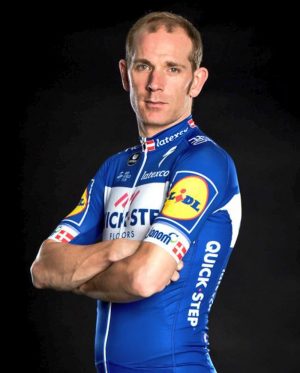
When we were over at Het Nieuwsblad and Kuurne Brussels Kuurne at the start of the season we were lamenting that with the retirement of Tom Boonen the mighty QuickStep team – the squad Michael Mørkøv has moved to the season – had perhaps lost their Talisman with not one QuickStep on the podium in either race.
We needn’t have worried; since then there have been nine classic or semi-classic races in Belgium – QuickStep have won eight of them.
And it took world champion Peter Sagan to deny them in the only race they didn’t win – Gent-Wevelgem, where they were second with Elia Viviani.
It started with Niki Terpstra winning Le Samyn; then Remi Cavagna won Dwars Door West Vlaanderen, first year pro Fabio Jakobsen won Nokere Koerse; another neo pro Alvaro Hodeg won Handzame; Elia Viviani won the new single day De Panne, Terpstra again in the E3, Yves Lampaert in Dwars Door Vlaanderen for the second consecutive year, Terpstra in the Ronde Van Vlaanderen and on Wednesday past it was young Jakobsen again in the Scheldeprijs.
Their win total for the year now stands at 24 with the victories not just down to one man but spread across the team – remarkable.
How do they do it?
We got in touch with Michael, our old friend and key lead out man in the QuickStep machine who was instrumental in Jakobsen’s most recent triumph and similarly ‘pilot fished’ Hodeg to a stage win in the Tour of Catalonia, to get ‘the word’ from the horse’s mouth.
Michael has been a world champion on the track, a multiple Six Day winner, Danish Elite Road Race Champion, a Grand Tour stage winner, stood on Classic podiums and has even enjoyed time in the polka dot jersey as mountains leader in the Tour de France.
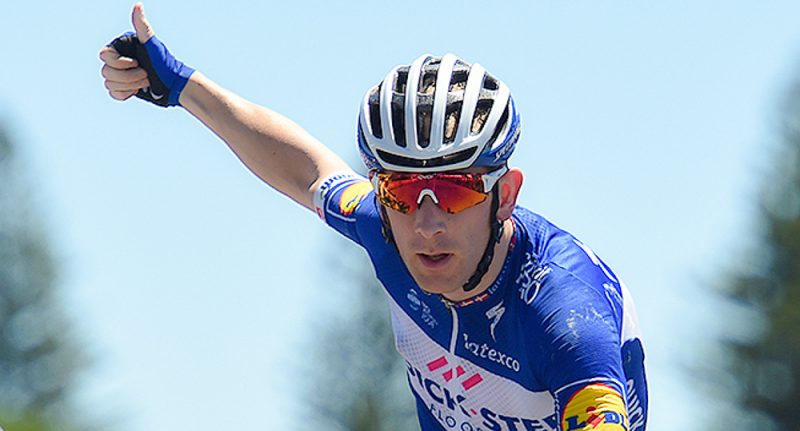
That was a nice job you did for Fabio in the Scheldeprijs finale, Michael – including that body check on Debusschere!
“I know that finish really well, with 200 metres to go it drifts to the left so the best line is to the left but a lot of guys make the mistake of going in the centre of the road.
“I went early with Fabio to get him that good line, Debusschere realised his mistake and came left on me, he pushed me but I pushed him back to protect Fabio’s line.”
The QuickStep ‘train’ formed late in the day…
“It was a different kind of finish because the bunch was so small with only 35/40 guys left – we were the only ones with four guys left and the other teams all seemed to be fighting with each other.
“Iljo Keisse and Stybie are very strong and brought Fabio and I up for the finale perfectly.”
Alvaro Hodeg punctured out of it, was he the protected rider and you changed to going with Fabio?
“No, Fabio was our man, Alvaro was meant to be do the final lead out after I did my stint but he punctured so it was down to me to do the final spell for Fabio.
“They both have so much potential, Alvaro won Handzame and then a stage in Catalonia – which was his first race at World Tour level; maybe the very best sprinters weren’t there but it was still a remarkable result.”
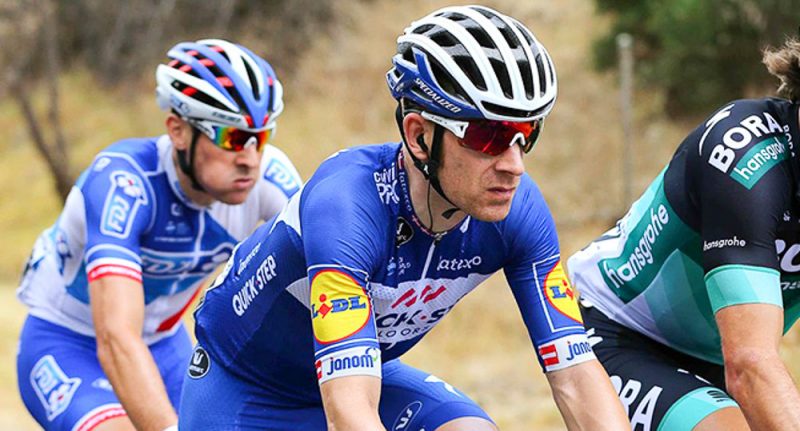
You were instrumental in that Catalonia win too?
“What’s really nice is that whoever is involved in the lead out, we’re getting it right, in Catalonia it was Max Schachmann and Bob Jungels who set things up for us.”
After Het Nieuwsblad and Kuurne we thought maybe QuickStep had ‘lost it’ but you’ve won eight out of nine Belgian cobbled races since then.
“Everybody is shaking their head, we can’t believe it; it’s extraordinary.
“We can’t say how or why – just good decisions, good luck and good morale.
“It’s not like at a Grand Tour where you have one sprinter who’s going really well and wins five stages for you, we’ve had 24 victories with a wide spread of guys getting the wins.
“I mean we’re well-trained and highly motivated but so are the other big teams…”
You came from Katusha to QuickStep, what are the differences?
“The QuickStep training camps were pretty similar to Katusha camps although I didn’t train with all of the guys, I was in the group going to Australia for the Tour Down Under.
“There’s not really a lot of differences between how big teams function.
“But what is different is the mentality, when you come to a team which has had 50-plus wins every year for several years you’re not really thinking; ‘I hope we can get a win in the first couple of months.’
“At Katusha we had three or four guys who could win a race – at QuickStep almost everyone can win a race; and the guys are all multi-talented, they can climb, sprint…
“I’d always wanted to ride for one of the big Belgian teams, I’m loving it; there is so much passion among the riders, the sports directors, and Patrick Lefevre.
“I think Belgium is the best place in the world for enthusiasm and passion for the sport of cycling.”
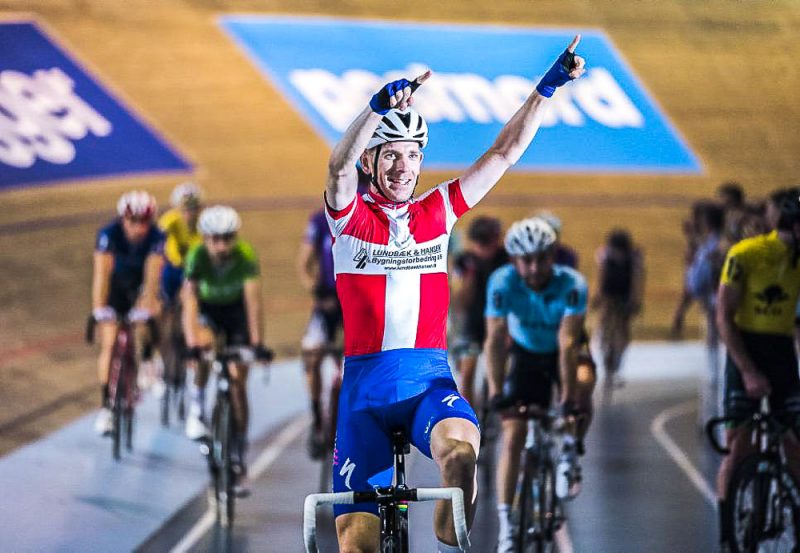
Patrick Lefevre, the Boss, tell us about him.
“I very much enjoy being part of Patrick Levere’s squad, it was an honour to meet with him, sign a contract and then ride with his team.
“He’s like a ‘Godfather of Professional Cycling,’ he’s created so many big wins and so much history.
“He’s a down to earth man but so passionate about cycling – you feel it immediately when you talk with him.
“You would imagine that it’s just the big races like Flanders, Roubaix and Tour de France stages which are important – but like all of the Belgian people EVERY race matters to him.”
You’ve been racing since mid-January, you must be due a break?
“I’m actually just starting one now, then I’ll be back for Romandie and building towards the Giro where I hope to be guiding Elia Viviani to stage wins.”
The Scheldeprijs could not have gone better for you but did you miss not riding the other Belgian cobbled races?
“I would have loved to ride more; it touched my heart to watch Flanders last Sunday – and I’ll feel the same again this Sunday with Roubaix, I love them.
“But I knew when I signed my contract with the team that those races were not the direction I was taking – my job is to develop as Elia’s lead out man.
“It’s a role I’m happy with and looking forward to carrying out.”
You rode the Tour Down Under and Abu Dhabi but somehow you managed to win the Copenhagen Six Day in between?
“It was a lot of jumping around!
“Maybe it was not the smartest to ride the Six Day when still jet lagged from Australia but the Copenhagen race is something I do from the heart – I love to ride in front of my home crowd.
“But I looked after myself really well during that period, I didn’t want to kill myself!
“It was good riding with Kenny De Ketele and whilst it’s always difficult to compare one Six Day to another I think we gave the crowd six nights of good racing.
“Sometimes in a Six there are nights when it’s tactical so not much happens but I’m proud of how we all rode – I think we delivered a good race.”
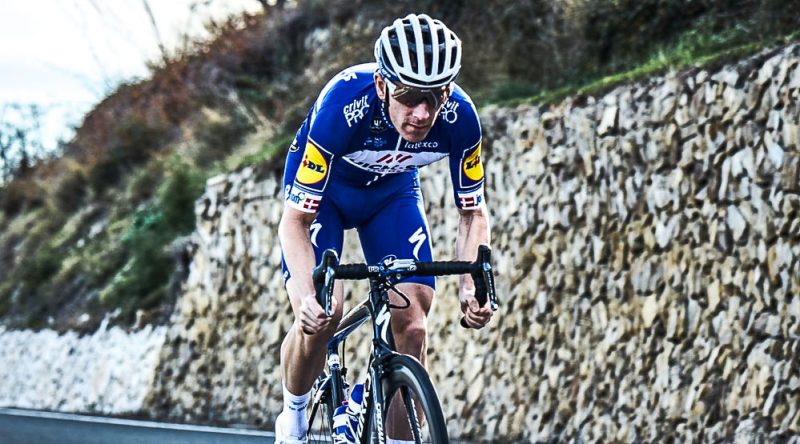
And now that you’re a QuickStep man and Iljo will be back, might we see you at Gent in November?
“I hope so, it would be super nice to team up with Iljo if Patrick will allow it.
“He was OK with me riding Copenhagen because he knew it meant a lot to me but I was just lucky it didn’t interfere with the road programme I had been set – if the road programme had been different then I couldn’t have ridden.
“But the thing about a Six Day is that it is good training too.”
It’s 10 years since you won your first UCI race on the road, a stage in the Giro del Capo in South Africa; back then did you imagine you’d be enjoying success with the world’s best team a decade later?
“Definitely not!
“My focus back then was on the track, we were riding that race for training as part of the Danish National Team Pursuit Squad, building for the Worlds.
“I was proud of that win and I dreamed of being a professional but I didn’t think I was being realistic.
“And even when I signed a contract with Bjarne Riis to ride for Saxo Bank in 2009 I wasn’t imaging that I would be still be a professional eight or 10 years later.
“But gradually I realised that the role I perform has value to a team and I’m an asset – I don’t deliver a lot of wins but I do a job for my team.”
The man does indeed do a job, just ask Fabio Jakobsen.
With thanks to Michael for his time, we look forward to speaking to him again as the season progresses and the QuickStep behemoth strides onwards.



